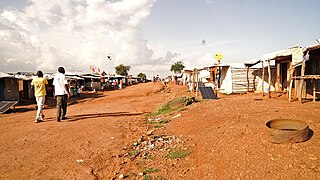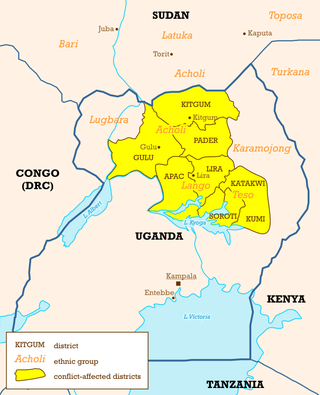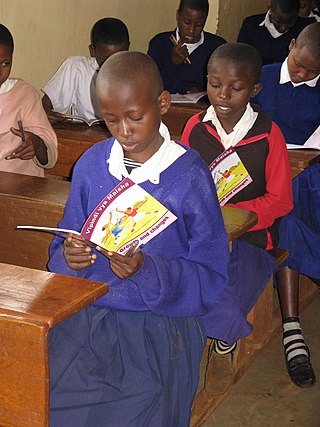
The Lost Boys of Sudan refers to a group of over 20,000 boys of the Nuer and Dinka ethnic groups who were displaced or orphaned during the Second Sudanese Civil War (1987–2005). Two million were killed and others were severely affected by the conflict. The term was used by healthcare workers in the refugee camps and may have been derived from the children's story of Peter Pan by J. M. Barrie. The term was also extended to refer to children who fled the post-independence violence in South Sudan in 2011–2013.
Alight, formerly the American Refugee Committee (ARC), is an international nonprofit, nonsectarian organization that has provided humanitarian assistance and training to millions of beneficiaries over the last 40 years.

Medair is an international non-governmental organisation (INGO) whose purpose is to relieve human suffering in some of the world's most remote and devastated places. Medair aims to assist people affected by natural disasters and conflict to recover with dignity through the delivery of quality humanitarian aid.
Kiryandongo Refugee Settlement is a refugee camp in Bweyale in Kiryandongo district Uganda.

Nakivale refugee settlement is a settlement located in Isingiro District near the Tanzania border in Southwest Uganda.
Kyangwali Refugee Settlement is a refugee camp in the Kibuube District in western Uganda. As of 2023, Kyangwali is home to 136,032 people.

Rhino Camp Refugee Settlement is a refugee camp located in the districts of Madi-Okollo and Terego District in North Western Uganda.
Pagirinya Refugee Settlement is a refugee camp in Eastern Adjumani District in Northern Uganda.

Bidibidi Refugee Settlement is a refugee camp in the Yumbe District of northwestern Uganda. Home to over 270,000 South Sudanese refugees fleeing the ongoing civil war in early 2017, it was among the largest refugee settlements in the world at the time, and may have been the largest. As of 2018, that distinction was claimed by Kutupalong refugee camp for displaced Rohingya in Bangladesh.

Child marriage is a marriage or union between a child under the age of 18 to another child or to an adult. Child marriage is common in a multitude of African countries. In South Sudan, child marriage is a growing epidemic. Child marriage in South Sudan is driven by socioeconomic factors such as poverty and gender inequality. Current figures state that South Sudan is one of the leading countries in the world when it comes to child marriage. Child marriage has negative consequences for children, including health problems and lower education rates for South Sudanese girls. Many initiatives have been taken to combat child marriage in South Sudan, but the presence of societal norms and instability continues to drive its presence in the nation.

Uganda is one of the largest refugee-hosting nations in the world, with 1,529,904 refugees. The vast influx of refugees is due to several factors in Uganda's neighboring countries, especially war and violence in South Sudan and the Democratic Republic of the Congo, and associated economic crisis and political instability in the region. Uganda has relatively 'friendly' policies that provide rights to the refugees, such as rights to education, work, private property, healthcare and other basic social services.
Imvepi Refugee Settlement is a refugee camp in Terego District in West Nile Sub Region of northwestern Uganda.
Nyumanzi Refugee Settlement is a refugee camp in Adjumani District in northwestern Uganda. Established in 2014, it hosts about 52,000 South Sudanese refugees.

Menstrual hygiene management (MHM) or menstrual health and hygiene (MHH) refers to access to menstrual hygiene products to absorb or collect the flow of blood during menstruation, privacy to change the materials, and access to facilities to dispose of used menstrual management materials. It can also include the "broader systemic factors that link menstruation with health, well-being, gender equality, education, equity, empowerment, and rights". Menstrual hygiene management can be particularly challenging for girls and women in developing countries, where clean water and toilet facilities are often inadequate. Menstrual waste is largely ignored in schools in developing countries, despite it being a significant problem. Menstruation can be a barrier to education for many girls, as a lack of effective sanitary products restricts girls' involvement in educational and social activities.
Baratuku refugee settlement is a refugee settlement in Adjumani district Uganda
Mungula II Refugee Settlement is a refugee camp found in Adjumani District Itirikwa subcounty in Northern Uganda.
Mungula refugee settlement is located in Adjumani district in northern Uganda on the border with South Sudan.
Palabek Refugee Settlement is a refugee camp located across the border from South Sudan in Lamwo District, Northern Uganda.

The Maaji refugee settlements are three refugee camps located in Adjumani District in the Northern Region of Uganda, established in 1997. In June 2018, there were 41,764 registered refugees, accounting for 10% of the district's total population. It has primarily admitted refugees from the Second Sudanese Civil War and the ongoing South Sudanese Civil War. The settlements have been attacked several times by the Lord's Resistance Army, along with other camps in the region such as the Baratuku refugee settlement.
Rhino Camp Extension Refugee settlement is a refugee camp located in Omugo Zone in Arua District in Uganda. It is also known as Rhino Refugee camp - Omugo zone Extension. It hosts over 43,000 refugees. It is located next to the Imvepi Refugee Settlement.









